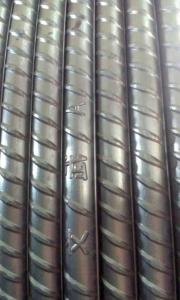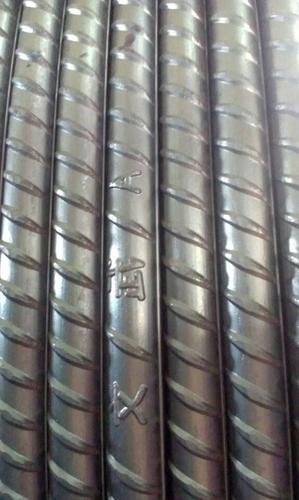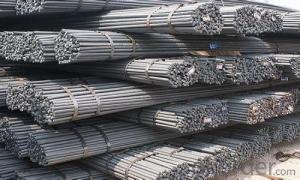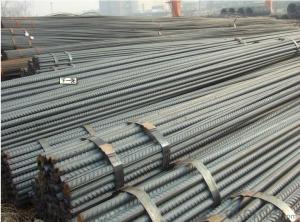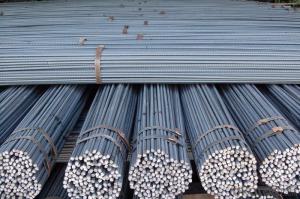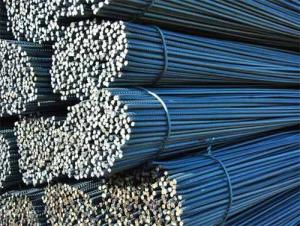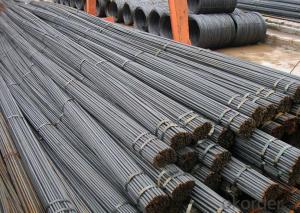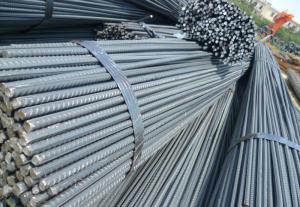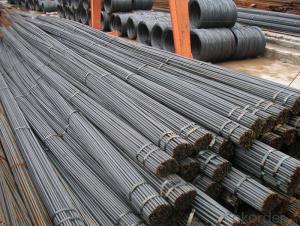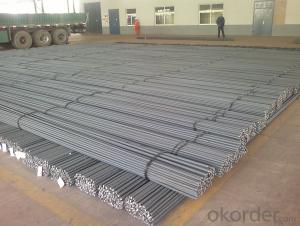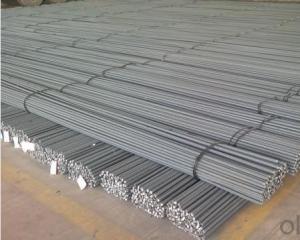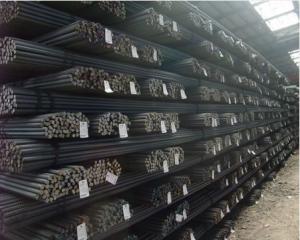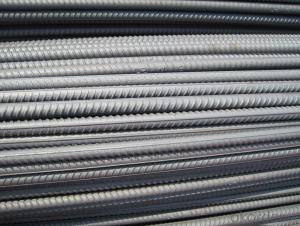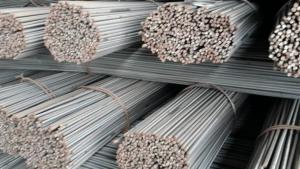Cold Rolled Steel Rebar 14mm
- Loading Port:
- China Main Port
- Payment Terms:
- TT OR LC
- Min Order Qty:
- -
- Supply Capability:
- -
OKorder Service Pledge
OKorder Financial Service
You Might Also Like
Theoretical weight and section area of each diameter as below for your information:
Diameter(mm) | Section area (mm²) | Mass(kg/m) | Weight of 12m (kg) | Pcs/ton |
6 | 28.27 | 0.222 | 2.664 | 375.38 |
8 | 50.27 | 0.395 | 4.74 | 210.97 |
10 | 78.54 | 0.617 | 7.404 | 135.06 |
12 | 113.1 | 0.888 | 10.656 | 93.84 |
14 | 153.9 | 1.21 | 14.52 | 68.87 |
16 | 201.1 | 1.58 | 18.96 | 52.74 |
18 | 254.5 | 2.00 | 24 | 41.67 |
20 | 314.2 | 2.47 | 29.64 | 33.74 |
22 | 380.1 | 2.98 | 35.76 | 27.96 |
25 | 490.9 | 3.85 | 46.2 | 21.65 |
28 | 615.8 | 4.83 | 57.96 | 17.25 |
32 | 804.2 | 6.31 | 75.72 | 13.21 |
36 | 1018 | 7.99 | 98.88 | 10.43 |
40 | 1257 | 9.87 | 118.44 | 8.44 |
50 | 1964 | 15.42 | 185.04 | 5.40 |
Cold Rolled Techniques
Yield Point: 545-565mpa
Deformed bar is widely used in buildings, bridges, roads and other engineering construction. Big to highways, railways, bridges, culverts, tunnels, public facilities such as flood control, dam, small to housing construction, beam, column, wall and the foundation of the plate, deformed bar is an integral structure material. With the development of world economy and the vigorous development of infrastructure construction, real estate, the demand for deformed bar will be larger and larger.
- Q: How are steel rebars protected against chemical attacks?
- Corrosion protection is a process that shields steel rebars from chemical attacks. Various techniques and materials are utilized to prevent corrosive substances from harming the rebar. One method commonly employed is the application of protective coatings. These coatings, such as epoxy or zinc, create a barrier on the rebar's surface, obstructing corrosive substances from reaching the steel. Moreover, these coatings offer added protection against moisture and other environmental factors that contribute to corrosion. Corrosion inhibitors are another means of safeguarding the rebars. These chemicals can be added to the concrete mix or directly applied to the rebar. By forming a protective layer on the steel's surface, corrosion inhibitors impede the corrosion process. These inhibitors can be organic or inorganic compounds, targeting specific corrosion mechanisms. In certain cases, stainless steel rebars are used to protect against chemical attacks. Stainless steel possesses greater resistance to corrosion in comparison to regular steel rebars. The presence of chromium creates a passive layer on the steel's surface, guarding it against chemical reactions. Stainless steel rebars are frequently utilized in highly corrosive environments, such as marine structures or wastewater treatment plants. Regular maintenance and inspection play a crucial role in safeguarding steel rebars against chemical attacks. Any signs of damage or corrosion should be promptly addressed. Regular cleaning and removal of corrosive substances that accumulate on the rebars also aid in preventing chemical attacks. In conclusion, a combination of protective coatings, corrosion inhibitors, stainless steel rebars, and regular maintenance is essential for protecting steel rebars against chemical attacks. These measures prolong the rebars' lifespan and uphold the structural integrity of concrete structures.
- Q: What is the role of steel rebars in minimizing the risk of progressive collapse?
- The risk of progressive collapse in structures can be significantly reduced by the use of steel rebars. Progressive collapse occurs when a primary structural element fails, causing adjacent elements to also fail and resulting in the collapse of the entire structure. In this context, steel rebars have a primary function of improving structural integrity and adding strength to load-bearing elements like columns, beams, and slabs. By reinforcing these elements with steel rebars, the structure becomes more resistant to sudden and catastrophic failures. Typically, steel rebars are embedded within the concrete, creating a composite structure known as reinforced concrete. These rebars serve as reinforcements against the concrete's weakness in tension. When subjected to loads, the rebars bear the tension forces while the concrete handles compression forces. This combination results in a more balanced distribution of the load and prevents localized failures. Steel rebars are especially important in preventing progressive collapse during unexpected failures or extreme events, such as explosions or impacts. They provide additional ductility and redundancy to the structure, ensuring that if one element fails, the load can be distributed to surrounding elements and preventing a domino effect of failure. Beyond preventing progressive collapse, steel rebars also contribute to the overall stability of a structure by increasing its load-carrying capacity. By reinforcing structural elements, they allow for larger spans and higher design loads, reducing the risk of overloading and potential failure. To maintain the effectiveness of steel rebars in minimizing the risk of progressive collapse, regular inspections and maintenance are necessary. These inspections involve checking for corrosion, ensuring proper placement, and providing adequate cover for the rebars to protect them from environmental factors that could compromise their integrity. In conclusion, the use of steel rebars is vital in minimizing the risk of progressive collapse. They reinforce critical load-bearing elements, enhance structural integrity, and provide redundancy. Steel rebars enable structures to withstand unexpected failures and extreme events, ensuring the safety and stability of buildings and infrastructure.
- Q: What is the purpose of stirrups in steel rebar reinforcement?
- The purpose of stirrups in steel rebar reinforcement is to provide lateral support and prevent the vertical bars from buckling or collapsing under load. They help distribute the load more evenly throughout the structure, enhancing its overall strength and durability. Stirrups also help to control the spacing and positioning of the vertical bars, ensuring proper reinforcement and preventing concrete cracking or failure.
- Q: What is the effect of exposure to chemicals on the durability of steel rebars?
- Exposure to chemicals can have a detrimental effect on the durability of steel rebars. Chemicals, such as acids or salts, can lead to corrosion and the formation of rust on the surface of rebars. This corrosion weakens the structure and compromises its integrity, reducing the lifespan and load-bearing capacity of the rebars. Regular inspection, maintenance, and protective coatings are crucial to mitigate the negative impact of chemical exposure and ensure the long-term durability of steel rebars.
- Q: What does "4esg25" mean on thread steel?
- 4esg25 these are the basic information of reinforcement, equivalent to the identity card information. Represents grade four steel (HRB500), and ESG represents the modulus of elasticity of the reinforcement in the reinforcement; then the nominal diameter is 25.
- Q: Are there any specific guidelines for storing and handling steel rebars?
- Specific guidelines exist for the storage and handling of steel rebars. Take note of the following essential points: 1. Storage: To prevent corrosion, it is necessary to store steel rebars in an area that is clean, dry, and well-ventilated. Place them on timber or other suitable materials to keep them elevated and away from moisture. 2. Handling: Exercise caution when handling steel rebars to avoid any damage or bending. It is advised to use appropriate equipment like cranes, forklifts, or sturdy hooks for lifting and moving rebars. Dragging or dropping them should be avoided as it may cause deformations and compromise their structural integrity. 3. Bundling: Properly bundle and secure rebars together using steel wires or straps to prevent rolling or shifting during storage or transportation. This ensures stability and reduces the risk of accidents. 4. Separation: Keep different sizes and types of rebars separate and clearly labeled to prevent confusion during construction. This facilitates easy identification and utilization of the required rebar according to the structural plans. 5. Protection: Guard rebars against exposure to moisture, rain, snow, and other weather elements. When storing rebars outdoors, utilize waterproof covers or tarps to shield them and prevent the formation of rust. 6. Inspection: Regular inspections should be conducted to identify signs of corrosion, damage, or bending. Any defective or compromised rebars must be promptly removed and replaced to maintain the structural integrity of the construction project. 7. Transportation: During transportation, ensure that rebars are securely fastened and loaded onto appropriate vehicles to prevent movement or falling off. Employ sufficient padding and tie-downs to protect rebars from damage and ensure safe transportation. Adhering to these guidelines is crucial in upholding the quality, durability, and safety of steel rebars throughout their storage and handling process.
- Q: Can steel rebars be used in swimming pool construction?
- Yes, steel rebars can be used in swimming pool construction. Steel rebars are commonly used as reinforcement in concrete structures, including swimming pools, to provide strength and durability. They help prevent cracking and ensure the overall stability of the pool structure.
- Q: How do steel rebars improve the load-carrying capacity of concrete?
- Steel rebars improve the load-carrying capacity of concrete through a combination of reinforcement and strength enhancement. When steel rebars are embedded within the concrete, they provide tensile strength to a material that is otherwise weak in tension. This is because concrete is strong in compression but relatively weak in tension. The rebars act as a support system within the concrete, distributing the load more evenly and preventing cracks or failure. When a load is applied to the concrete, the rebars resist the tensile forces and help to hold the concrete together, increasing its ability to carry and distribute the load. Furthermore, steel rebars also enhance the ductility of concrete. Ductility refers to the ability of a material to deform without fracturing. By adding steel rebars, the concrete becomes more flexible and capable of withstanding greater stress and strain without failure. This is particularly important in structures subject to earthquakes, as the ability to absorb and dissipate energy is crucial for their overall integrity. In summary, steel rebars improve the load-carrying capacity of concrete by reinforcing it with tensile strength, distributing the load more evenly, preventing cracks, and enhancing its overall ductility. This combination of reinforcement and strength enhancement significantly increases the structural stability and durability of concrete structures.
- Q: How are steel rebars cut to specific lengths?
- Steel rebars are cut to specific lengths using heavy-duty tools such as hydraulic shears, manual rebar cutters, or abrasive cutting wheels. These tools provide the necessary force and precision to cut through the strong and dense steel material, allowing rebars to be cut to the desired lengths for construction purposes.
- Q: What is the process of inspecting steel rebars for quality control?
- The process of inspecting steel rebars for quality control involves several steps. First, the rebars are visually inspected for any visible defects such as cracks, rust, or surface irregularities. Next, the rebars are measured to ensure they meet the required dimensions and tolerances. This includes checking their length, diameter, and weight. Additionally, rebars may undergo non-destructive testing techniques like ultrasonic testing or magnetic particle inspection to detect any internal flaws or discontinuities. Finally, samples may be taken from the batch of rebars and tested for mechanical properties such as tensile strength, yield strength, and elongation to verify their quality.
Send your message to us
Cold Rolled Steel Rebar 14mm
- Loading Port:
- China Main Port
- Payment Terms:
- TT OR LC
- Min Order Qty:
- -
- Supply Capability:
- -
OKorder Service Pledge
OKorder Financial Service
Similar products
Hot products
Hot Searches
Related keywords
